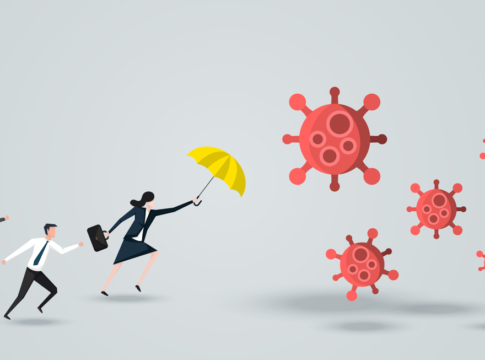MEO has the pleasure to introduce a new article for Dr. Mohamed Fateen, Lecturer and Consultant of Hematology, Clinical Pathology Department, Kasr Alainy Faculty of Medicine, Cairo University, tackling COVID-19 from several critical perspectives.
By the end of 2020, a new variant of the COVID-19 virus was identified in the UK, having several mutations in its spike protein with a higher ability for transmission than the wild type identified in December 2019. The WHO used the Greek letter alpha to name the variant in public communication that is otherwise known as the UK or Kent variant. The delta COVID-19 variant, which was first detected in India in 2021, has overtaken the alpha variant, to make it one of the most dominant strains around the world.
The ever repeating question is how do new strains emerge? Each virus has a sequence of nucleotides that replicates when the virus spreads. Minor slips in the genetic code often occur with the constant replication, creating a new sequence of nucleotides that might form new properties for the virus, while keeping its major identity, hence creating a new strain. Although the virus keeps its phenotype, the behavior might be quite different than the wild type. Some viruses become more virulent, while others might acquire higher proliferative potential or better transmissibility, thus causing a more severe disease form. Virus vaccines were made to help the body fight the virus by teaching the immune system how to identify parts of the virus to overcome it.
Till this day, it has been reported that people who were vaccinated were less prone to severe infections, hospital admission and death. While developed countries have undergone serious efforts to vaccinate masses of the population, in Egypt we still have long miles to go to achieve a proper percentage of vaccination; on the other hand, by some form of miracle or as we say in Arabic ‘God’s protection’, the third wave of the virus has ended (probably caused by herd immunity) and most of the isolation hospitals around the country have reopened to accept non-COVID-19-related cases; like before the pandemic. Infection rates have declined tremendously and finally we can see the light at the end of the tunnel, as this will allow the government to win some time to vaccinate higher numbers of people and for the economy to recollect itself after almost one and a half year of instability.
The economic recession was worldwide affecting many businesses, especially the small ones and the startups that were struggling at the time of lockdown. Although with the start of the pandemic, economy in Egypt has taken a strong dip, seen most obviously in the tourism industry, restaurants and movie theatres, the loosened lockdown that was applied helped partially alleviate some of the ordeal; in comparison to other countries where extremely strict measures were taken. Not everyone was affected by the pandemic in a negative way, many businesses have thrived, like online learning platforms that were occasionally used in the past, have now become an essential component in every home. Some businesses seized the opportunity and shut down their offices to depended on work-from-home concept, allowing them to save millions payed for rent and for the daily expenses to run their offices. The ones that benefited most were without doubt pharmaceutical industries producing sanitizers, protective equipment and of course the vaccines. Healthcare facilities and hospitals that provided services for coronavirus patients had their fair share; on the contrary, hospitals and clinics that depended on elective procedures such as cosmetic surgeries suffered a lot when patients were trying to avoid unnecessary procedures.
Many question whether we are at the end of an era of turbulence, or just the beginning of a new lifestyle controlled by diseases and pandemics. But looking at the situation last year and looking at it today, we can certainly feel the change for the better coming. One obvious example would be the stadium at Wembley at the Euro final match and how it was filled with more than 60000 spectators, most of them not wearing face masks, in a country that reported thousands of new cases each day last January.
Considering the past, humanity was struck by various diseases that affected the world, but none were able to threaten the human race in a serious matter. Viruses and bacteria existed on earth millions of years ago and the human body’s immune system is an extremely complicated synchronized system that was developed over time to be able to protect our race for thousands of years. In addition to the aforementioned natural protection, technology has developed exponentially over the past 100 years and the time taken to develop a vaccine or a drug has decreased. The world has learnt its lesson from the COVID-19 pandemic and better safety measures will be applied in the future in case a new virus emerges. No-one can tell for sure if COVID-19 pandemic is about to end, but with the introduction of the vaccine around the world a better tomorrow is expected.
Lecturer and Consultant of Hematology, Clinical Pathology department, Kasr Alainy Faculty of Medicine, Cairo University.



